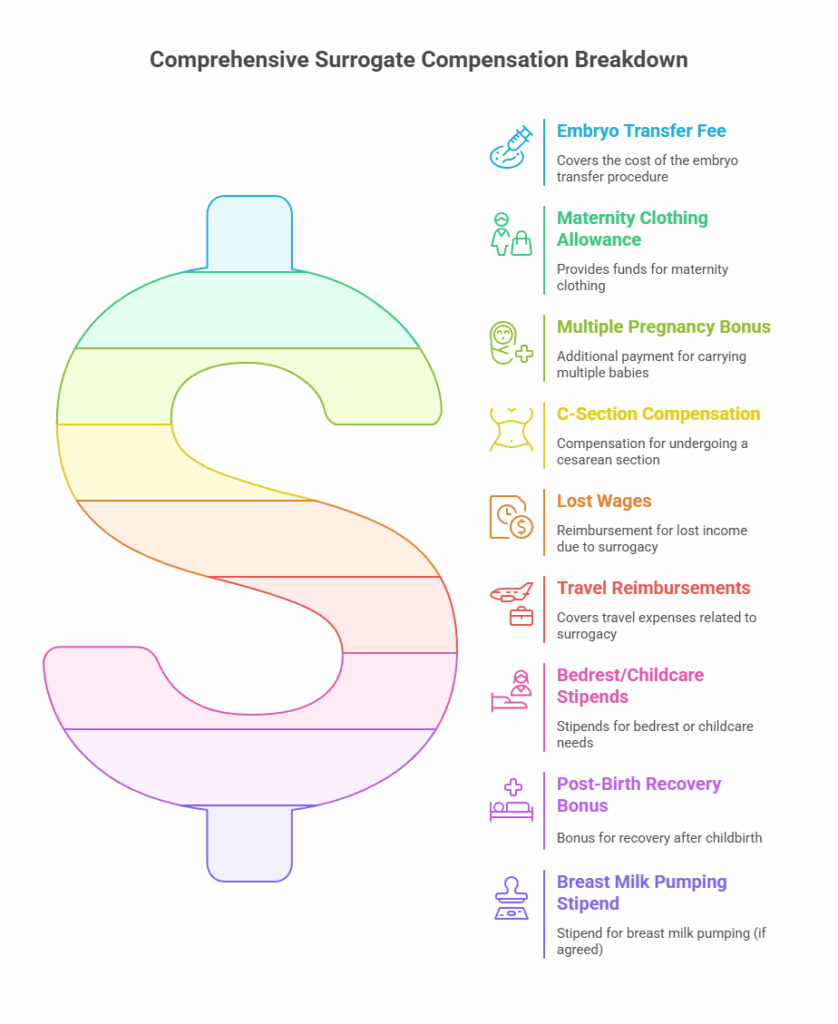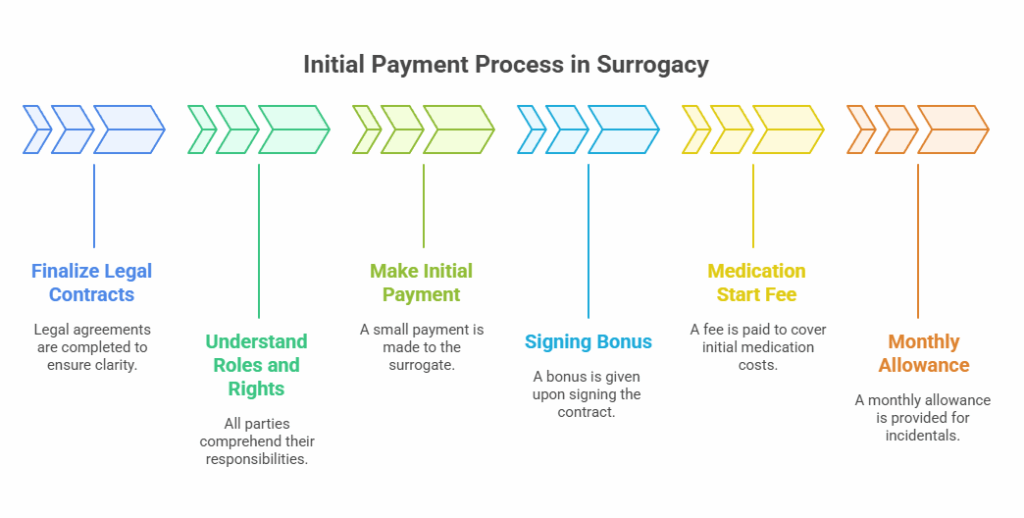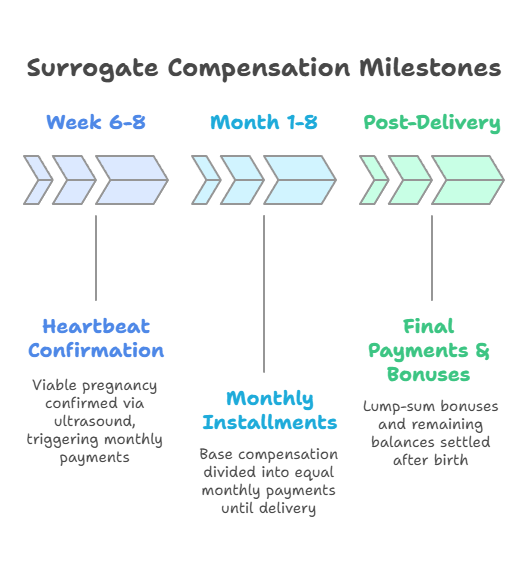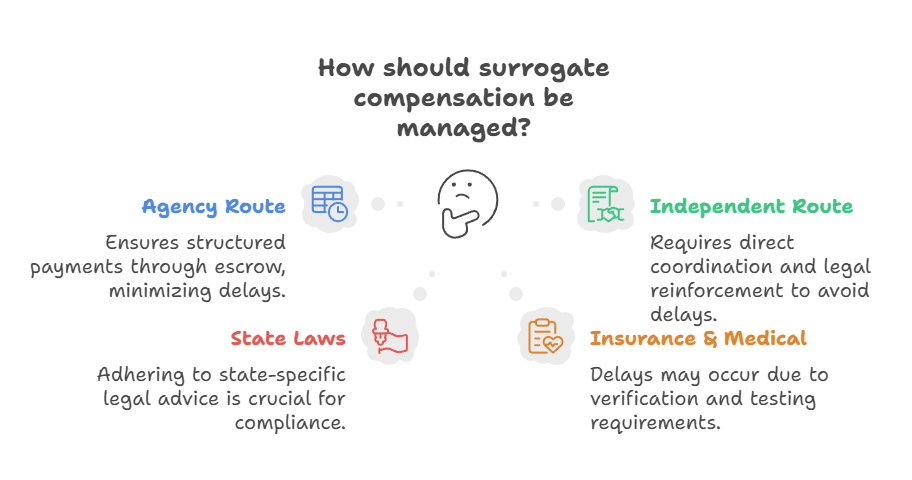Summary: Surrogates typically begin receiving monthly payments after a confirmed pregnancy with a heartbeat (around week 6–8). Before that, they may receive minor stipends post-contract or for embryo transfer. Full compensation is disbursed in stages, not as a lump sum.
If you’re considering becoming a surrogate, or you’re an intended parent preparing for your journey, one of the most common and crucial questions is: “When do surrogates get paid?”
The short answer: after pregnancy is confirmed — and then, monthly — with additional payments at key milestones.
Let’s walk through this with more clarity.
More: How Much Does It Pay to Be a Surrogate?
The Structure of Surrogate Compensation
Before diving into timelines, it’s essential to understand what surrogate compensation includes. Surrogacy is a complex, emotional, and legally binding arrangement, so compensation reflects both the physical commitment and the responsibilities a surrogate takes on.
1. Base Compensation
This is the main payment made to the surrogate for carrying the baby. The total amount varies depending on factors like location, experience, whether it’s a first or second journey, and whether she’s going through an agency or matched independently. In the U.S., base compensation typically ranges from $40,000 to $60,000+.
2. Additional Payments (Itemized Reimbursements & Allowances)
Surrogates also receive supplemental compensation for various medical and logistical aspects of the journey:
- Embryo transfer fee
- Maternity clothing allowance
- Multiple pregnancy (twins, triplets) bonus
- C-section compensation
- Lost wages (if employed)
- Travel reimbursements
- Bedrest or childcare stipends
- Post-birth recovery bonus
- Breast milk pumping stipend (if agreed)
This structured approach ensures fair compensation for the demands at each stage.

When Payments Actually Start
Let’s break it down by phases:
1. After Legal Contracts Are Signed
Once legal contracts are finalized between the intended parents and the surrogate — a process that ensures everyone understands their roles and rights — a small initial payment may be made.
This could be:
- A signing bonus
- A medication start fee
- A monthly allowance for incidentals (travel, communication)
💡 This phase usually involves small payments only — not the full base compensation.
More: What Disqualifies You from Being a Surrogate? Key Requirements and Exclusions

2. After Embryo Transfer
Some agreements include a transfer fee — a one-time payment for undergoing the embryo transfer procedure. This typically ranges from $500 to $1,000 and helps compensate for recovery time and potential time off work.
However, this is still not the start of monthly base compensation.
3. Once Pregnancy is Confirmed (Usually by Heartbeat)
The first major milestone for full compensation is heartbeat confirmation — usually around week 6 to 8 of pregnancy.
At this point, medical professionals confirm a viable pregnancy via ultrasound. Once confirmed:
- Monthly payments begin
- Base compensation is divided over equal monthly installments until delivery
- Payment continues whether the surrogate is working or on bedrest
For example, if a surrogate’s base pay is $50,000 and the pregnancy progresses for 8 months after confirmation, she might receive around $6,250/month.
4. Post-Delivery Payments
Some agreements include final lump-sum bonuses or recovery stipends after birth, such as:
- A postpartum recovery bonus
- Continued lost wages if the surrogate needs additional recovery time
- Breast milk pumping stipends (up to $300/week)
All remaining balances, if any, are usually settled shortly after delivery.
More: Requirements to Be a Surrogate: Are You Eligible?

Example Payment Timeline
Here’s a simplified version of a surrogate compensation timeline:
| Milestone | Typical Payment |
|---|---|
| Contract Signed | $500–$1,000 (optional bonus) |
| Medication Start | $250–$500 |
| Embryo Transfer | $500–$1,000 |
| Pregnancy Confirmation (Heartbeat) | Begin monthly base payments |
| 2nd Trimester | Maternity clothing allowance |
| Birth (Delivery) | Final monthly payment + recovery allowance |
| Postpartum | Pumping bonus (if applicable), last reimbursements |
All of these payments are managed either directly by the intended parents or, more commonly, through a third-party escrow account, which adds security and transparency for both parties.
What Influences Payment Timing?
There’s no universal rulebook, but some factors can affect when and how surrogates are paid:
1. Agency vs. Independent
- Agencies typically follow standard procedures, ensuring timely and structured payments through escrow.
- Independent matches may require more direct coordination and legal reinforcement to avoid delays.
2. State Laws and Regulations
Some U.S. states have stricter guidelines on when and how surrogate compensation can be provided. It’s always important to follow state-specific legal advice.
3. Insurance & Medical Requirements
Insurance verification and certain medical tests might delay official confirmation of pregnancy, which can push back the start of monthly payments.

What If a Surrogate Miscarriages?
This is a sensitive but necessary topic.
If a miscarriage occurs:
- The surrogate is still compensated for services up to that point.
- Depending on the timing, part of the base compensation may have already been paid.
- If the journey continues (with another transfer), payment resets with each new cycle.
Agencies typically outline very clearly what happens in such situations, ensuring the surrogate is never left unsupported.
More: From Start to Finish: A Surrogate Mother’s Guide to the Surrogacy Timeline
A Note on Trust & Transparency
Trust is crucial in any surrogacy journey. That’s why legal contracts, escrow services, and clear communication are essential — not just to ensure payments are made on time, but to honor the surrogate’s dedication and protect intended parents from unforeseen financial complications.
Intended parents should never handle payments informally or without documentation. And surrogates should never feel unsure about when or how they’ll be paid.
Final Thoughts
Becoming a surrogate is a selfless act that changes lives. While money isn’t the main reason many women choose this path, it’s a critical piece of making the process sustainable, fair, and respectful.
To recap:
- Small payments may begin after signing contracts
- Full monthly payments begin after a confirmed pregnancy (usually 6–8 weeks)
- Compensation is divided into installments and delivered via escrow
- Bonuses and reimbursements continue through delivery and sometimes beyond
If you’re considering surrogacy — as a potential surrogate or intended parent — always work with experienced professionals, ask questions, and ensure payment structures are clear before beginning your journey.




